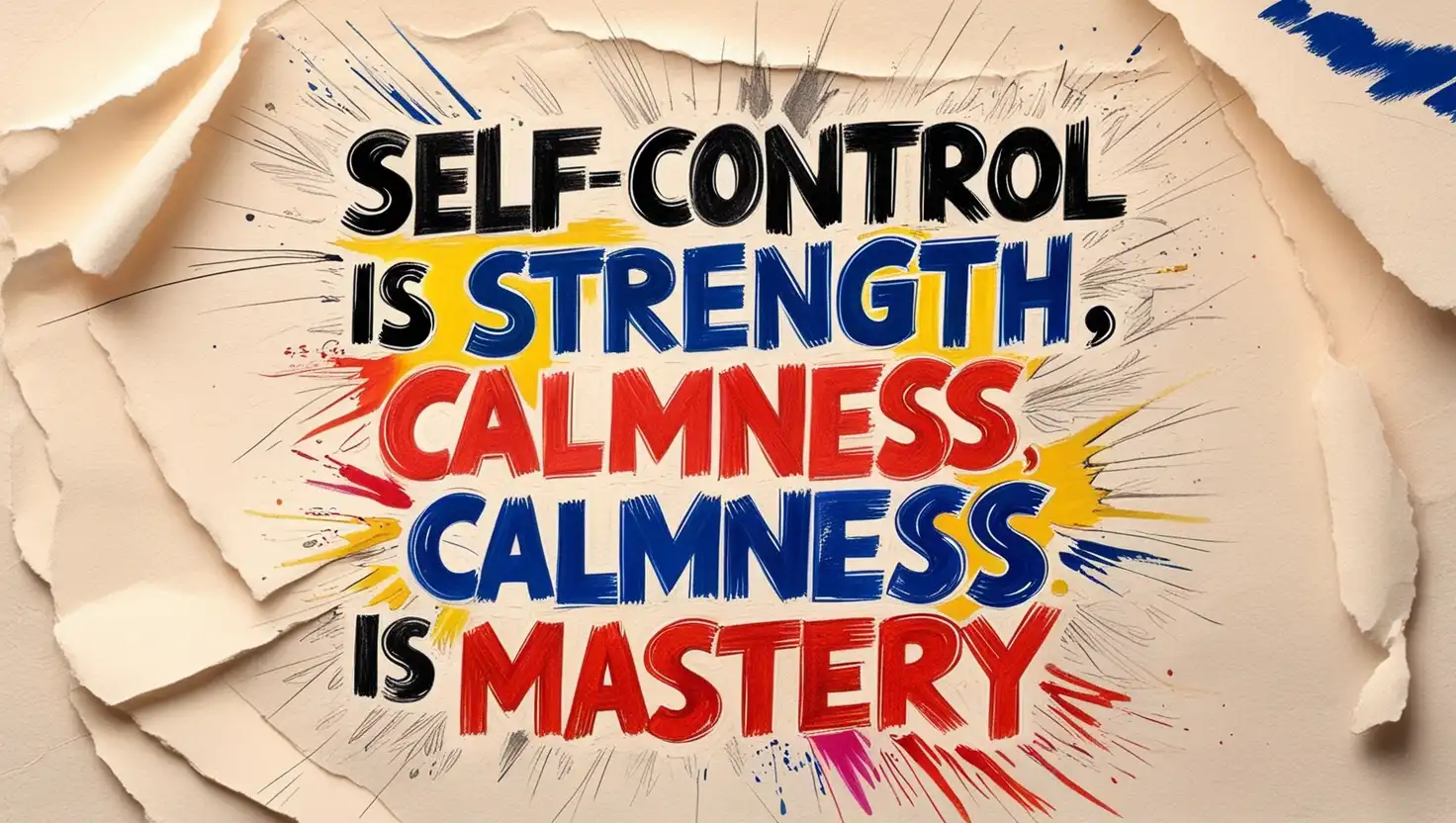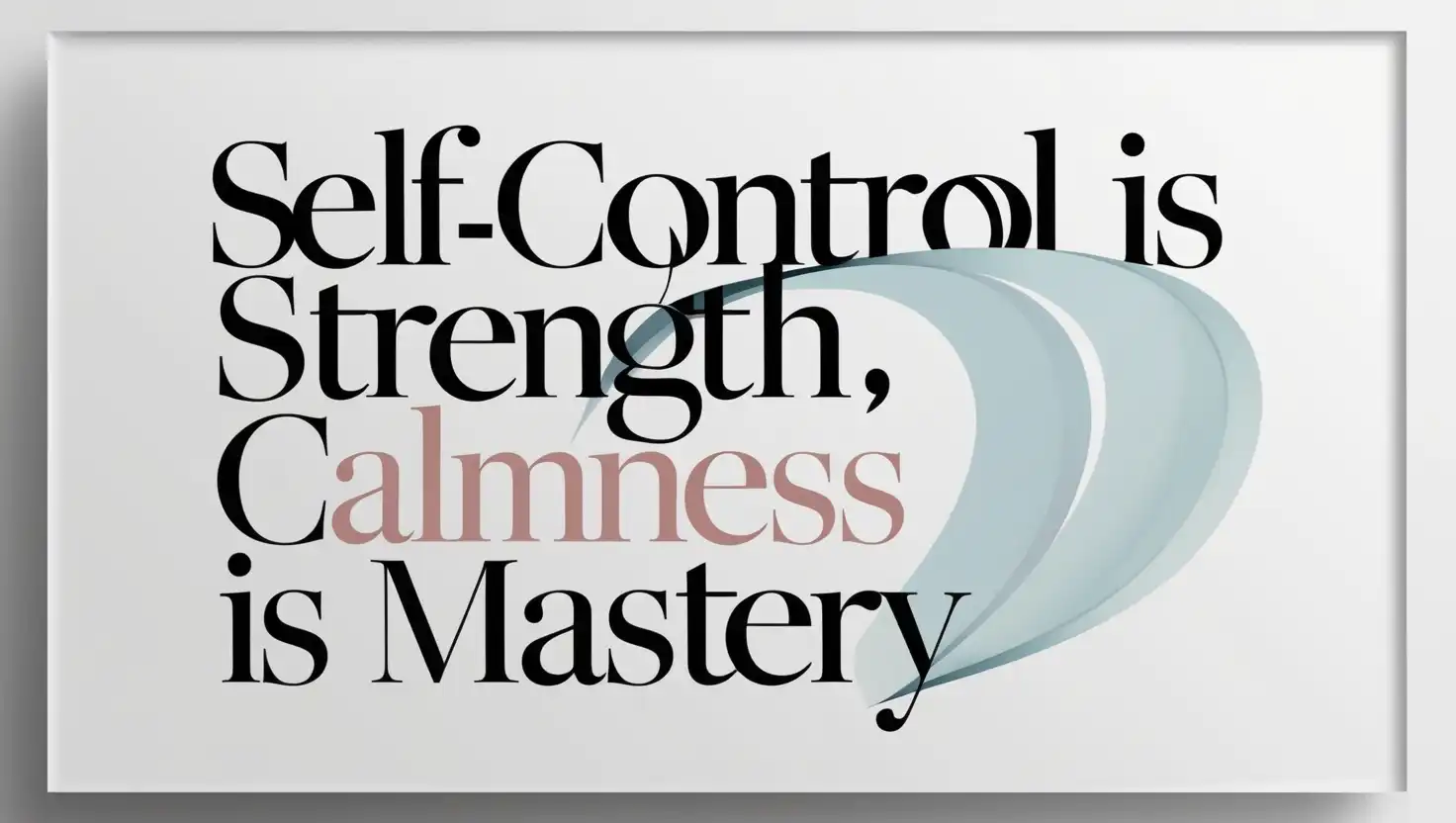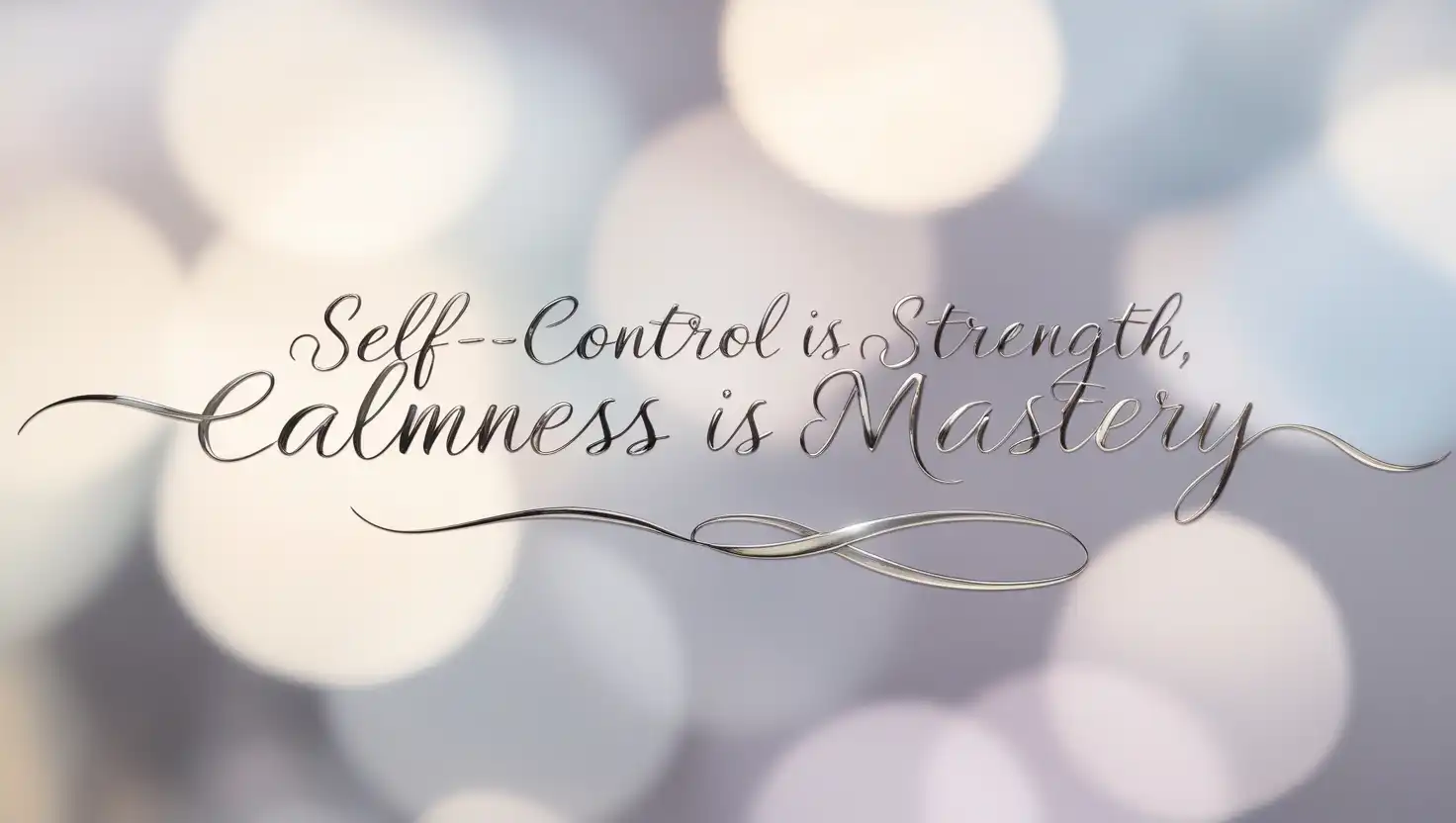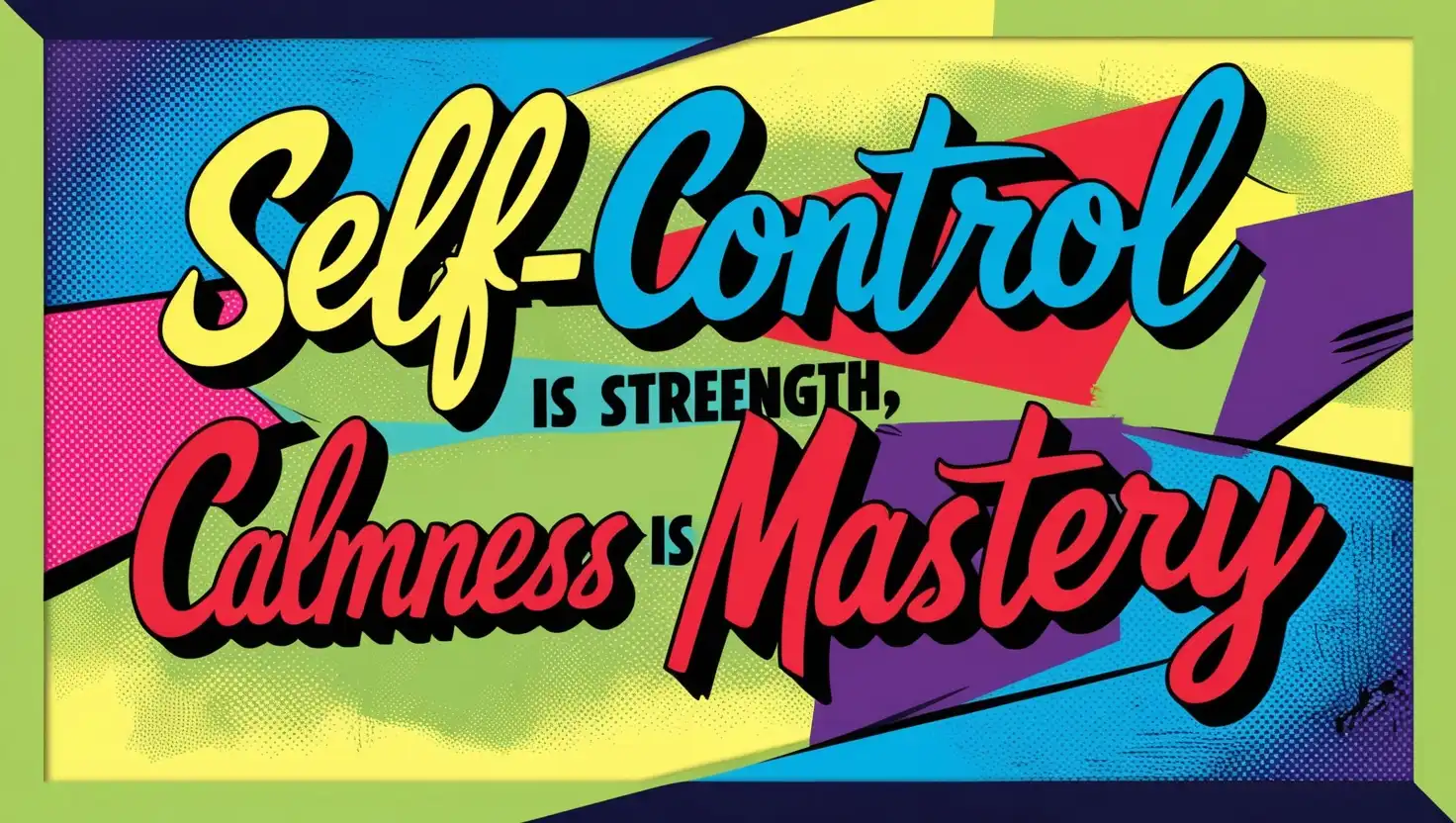In the fast-paced and often chaotic world we live in, two qualities stand out as essential for leading a balanced and successful life: self-control and calmness. Self-control is the strength that helps you stay on track with your goals and resist short-term temptations.
Morgan Freeman: Self-control is strength. Calmness is mastery.

Calmness is the mastery that allows you to navigate life’s challenges with grace and composure. Together, these qualities empower you to make better decisions, maintain emotional balance, and achieve long-term success.
Understanding Self-Control
What Is Self-Control?
Self-control is the ability to regulate your thoughts, emotions, and behaviors in the face of temptations and impulses. It’s about making conscious choices that align with your long-term goals rather than giving in to immediate desires. This quality is not just about resisting temptations like junk food or procrastination but also about staying focused, disciplined, and committed to your values.
The Importance of Self-Control
Self-control is a crucial factor in personal success and well-being. It allows you to:
- Achieve Goals: By staying focused and avoiding distractions, self-control helps you reach your long-term objectives.
- Maintain Discipline: It helps you stick to routines and habits that support your overall health and happiness.
- Improve Relationships: Self-control enables you to manage your emotions, leading to healthier and more stable relationships.
- Enhance Decision-Making: With self-control, you can make more thoughtful and rational decisions, avoiding impulsive actions that you might later regret.
Developing Self-Control
While some people may naturally have more self-control than others, it is a skill that can be developed and strengthened over time. Here are some strategies to help you cultivate self-control:
Set Clear Goals
Having clear, specific goals gives you a sense of direction and purpose. When your goals are well-defined, it’s easier to make decisions that align with them.
- Write Down Your Goals: Make a list of your short-term and long-term goals. Keep this list somewhere visible to remind yourself of what you’re working towards.
- Break Down Goals into Smaller Steps: Large goals can be overwhelming. Break them down into smaller, manageable tasks to make progress more achievable.

Practice Delayed Gratification
Delayed gratification is the ability to resist the temptation of an immediate reward in favor of a later, often greater, reward. It’s a key aspect of self-control.
- Use the 10-Minute Rule: When faced with a temptation, wait 10 minutes before giving in. This short delay can help you overcome impulsive urges.
- Focus on Long-Term Benefits: Remind yourself of the long-term benefits of resisting short-term temptations. Visualize the positive outcomes of your self-control.
Create a Supportive Environment
Your environment plays a significant role in your ability to exercise self-control. By shaping your environment to support your goals, you can reduce the likelihood of giving in to temptations.
- Remove Temptations: If you’re trying to eat healthier, keep unhealthy snacks out of your home. If you’re trying to focus on work, minimize distractions in your workspace.
- Surround Yourself with Positive Influences: Spend time with people who support your goals and encourage positive behaviors. Their influence can help reinforce your self-control.
Practice Mindfulness
Mindfulness is the practice of staying present and aware of your thoughts and feelings without judgment. It helps you become more conscious of your impulses and make more deliberate choices.
- Mindful Breathing: Take a few deep breaths to center yourself when you feel the urge to act impulsively. This simple practice can create a pause between your impulse and your action.
- Mindful Decision-Making: Before making a decision, take a moment to consider how it aligns with your long-term goals and values. This moment of mindfulness can prevent impulsive actions and reinforce self-control.

Build Healthy Habits
Habits are powerful because they allow you to perform actions automatically, without needing to exert much self-control. By building healthy habits, you can conserve your self-control for more challenging situations.
- Start with Routine: Establish a daily routine that includes positive habits, such as exercising, eating healthily, and setting aside time for relaxation. The more consistent your routine, the less you’ll need to rely on willpower.
- Use Habit Stacking: Link a new habit to an existing one. For example, if you already brush your teeth every morning, you can add a few minutes of meditation right after brushing your teeth. This makes it easier to incorporate new habits into your routine.
Develop Emotional Intelligence
Emotional intelligence is the ability to recognize, understand, and manage your own emotions, as well as the emotions of others. High emotional intelligence supports self-control by helping you navigate emotional triggers more effectively.
- Identify Triggers: Pay attention to situations that often lead to a loss of self-control, such as stress, fatigue, or certain social settings. By identifying these triggers, you can prepare strategies to handle them.
- Practice Empathy: Understanding the emotions and perspectives of others can help you respond more thoughtfully in challenging situations, rather than reacting impulsively.
Cultivating Calmness
Why Calmness Is Important
Calmness is not just the absence of stress or anxiety but a state of inner peace and tranquility that allows you to navigate life’s challenges with clarity and resilience. When you are calm, you can think more clearly, make better decisions, and respond to situations in a way that aligns with your values.
Practical Ways to Cultivate Calmness
Cultivating calmness is about creating a state of inner peace that can withstand external pressures. Here are practical strategies to help you build and maintain calmness in your life.
Practice Deep Breathing
Deep breathing is a simple but powerful technique that can instantly bring a sense of calm. It helps slow down your heart rate, lower blood pressure, and reduce stress.
- The 4-7-8 Technique: Inhale deeply through your nose for 4 seconds, hold your breath for 7 seconds, and exhale slowly through your mouth for 8 seconds. Repeat this cycle several times whenever you feel stressed.
- Belly Breathing: Focus on breathing deeply into your abdomen rather than shallow breathing into your chest. Place your hand on your stomach and feel it rise and fall with each breath.

Meditate Regularly
Meditation is one of the most effective practices for cultivating calmness. It trains your mind to focus, reduces stress, and enhances emotional well-being.
- Start Small: If you’re new to meditation, start with just 5-10 minutes a day. Gradually increase the time as you become more comfortable with the practice.
- Guided Meditation: Use apps or online resources that offer guided meditation sessions. These can help you stay focused and make the practice more accessible.
Simplify Your Life
Simplifying your life reduces stress and creates more space for calmness. This can involve decluttering your physical space, simplifying your schedule, or minimizing commitments.
- Declutter Your Space: A cluttered environment can contribute to a cluttered mind. Take time to organize your living and working spaces, keeping only what you truly need or love.
- Prioritize Your Time: Identify the most important tasks and commitments in your life. Focus on these priorities and let go of activities that don’t align with your goals or values.
Practice Mindfulness
Mindfulness is the practice of staying present and fully engaged in the current moment. It’s a key component of calmness, helping you to avoid becoming overwhelmed by past regrets or future worries.
- Mindful Walking: Take a walk outdoors and focus on the sensations of each step, the sounds around you, and the feeling of the air on your skin. This simple practice can help ground you in the present moment.
- Mindful Listening: When talking to someone, give them your full attention. Listen to their words without planning your response or getting distracted. This not only fosters calmness but also improves your relationships.
Develop a Positive Mindset
A positive mindset doesn’t mean ignoring life’s challenges, but rather approaching them with a constructive attitude. It helps you maintain calmness by reducing negative thinking patterns.
- Practice Gratitude: Take a few minutes each day to reflect on the things you’re grateful for. This practice shifts your focus from what’s wrong to what’s right in your life.
- Reframe Challenges: When faced with a difficult situation, try to see it as an opportunity for growth rather than a setback. This shift in perspective can help you approach challenges with a calmer, more resilient mindset.
Stay Physically Active
Physical activity is not only good for your body but also for your mind. Regular exercise releases endorphins, which are natural mood boosters, and helps reduce stress.
- Choose Activities You Enjoy: Whether it’s walking, yoga, dancing, or swimming, choose activities that you enjoy and that make you feel good. This makes it easier to stay consistent.
- Incorporate Movement into Your Day: You don’t need to hit the gym to stay active. Simple activities like taking the stairs, stretching at your desk, or doing a quick workout at home can help you stay physically and mentally balanced.

Applying Self-Control and Calmness in Different Areas of Life
Now that we’ve explored how to cultivate self-control and calmness, let’s look at how these qualities can be applied to various aspects of your life.
Relationships
Healthy relationships require both self-control and calmness. These qualities help you navigate conflicts, communicate effectively, and maintain emotional balance.
- Practice Active Listening: When talking to a partner, friend, or family member, practice active listening. This means fully focusing on what the other person is saying without interrupting or planning your response. Active listening fosters calm and thoughtful communication.
- Manage Conflicts Calmly: When conflicts arise, take a moment to breathe and gather your thoughts before responding. Approaching disagreements with calmness and self-control can lead to more constructive and peaceful resolutions.
Three Inspirational Women Who Have Delivered Incredible TED Talks.
Work and Career
In the workplace, self-control and calmness are essential for productivity, decision-making, and leadership.
- Prioritize Tasks: Use self-control to prioritize your tasks and focus on what’s most important. This prevents you from getting overwhelmed by less critical tasks and helps you stay on track with your goals.
- Stay Calm Under Pressure: In high-pressure situations, staying calm allows you to think clearly and make better decisions. Practice deep breathing or take short breaks to maintain your composure during stressful moments.
Health and Well-Being
Your physical and mental health are closely linked to your ability to exercise self-control and maintain calmness.
- Make Healthy Choices: Use self-control to make healthy lifestyle choices, such as eating nutritious foods, getting regular exercise, and avoiding harmful habits.
- Manage Stress: Incorporate calming practices into your daily routine, such as meditation, deep breathing, or spending time in nature. These practices can help reduce stress and improve your overall well-being.
Financial Management
Managing your finances effectively requires both self-control and calmness. These qualities help you make sound financial decisions and avoid impulsive spending.
- Create a Budget: Use self-control to stick to a budget that aligns with your financial goals. Track your spending and make adjustments as needed to stay on track.
- Stay Calm During Market Fluctuations: If you’re investing, it’s important to stay calm during market fluctuations. Panic selling can lead to losses, while a calm and steady approach often yields better long-term results.
Leadership
In leadership roles, self-control and calmness are invaluable qualities. They help you make sound decisions, inspire confidence in your team, and navigate challenges with resilience.
- Instilling Confidence: A calm leader instills confidence in their team. When a leader remains composed under pressure, it reassures the team that they are in capable hands.
- Navigating Crisis: In times of crisis, calmness is crucial. It allows leaders to think clearly, assess the situation, and take decisive action without being overwhelmed by stress.
- Building Trust: Calm leaders are approachable and dependable. Their consistent behavior builds trust with their team, fostering a positive and productive work environment.

Conclusion: Embracing Self-Control and Calmness in Daily Life
Self-control and calmness are not just abstract concepts but practical tools that can transform your life. By cultivating these qualities, you can achieve greater emotional balance, make better decisions, and navigate life’s challenges with resilience and grace.
Remember, self-control is the strength that helps you stay true to your goals, while calmness is the mastery that allows you to maintain peace of mind. Together, they empower you to lead a more fulfilling and balanced life.
7 FAQs About Self-Control and Calmness
1. How can I improve my self-control?
Answer: You can improve self-control by setting clear goals, practicing delayed gratification, creating a supportive environment, and building healthy habits.
2. What are some simple techniques to stay calm in stressful situations?
Answer: Deep breathing, mindfulness, and regular physical activity are effective techniques for staying calm in stressful situations.
3. Can self-control and calmness help with anxiety?
Answer: Yes, both self-control and calmness can help manage anxiety by promoting emotional regulation, reducing impulsive reactions, and enhancing mental clarity.
4. How does self-control contribute to long-term success?
Answer: Self-control contributes to long-term success by helping you stay focused on your goals, resist short-term temptations, and maintain discipline over time.
5. Why is calmness important in leadership?
Answer: Calmness is important in leadership because it helps leaders make sound decisions, instills confidence in their teams, and allows them to navigate crises effectively.
6. Can mindfulness improve both self-control and calmness?
Answer: Yes, mindfulness can improve both self-control and calmness by helping you stay present, manage your emotions, and make thoughtful decisions.
7. How do self-control and calmness affect relationships?
Answer: Self-control and calmness improve relationships by enhancing communication, managing conflicts effectively, and fostering emotional balance.
Join 25,000+ smart readers—don’t miss out!









